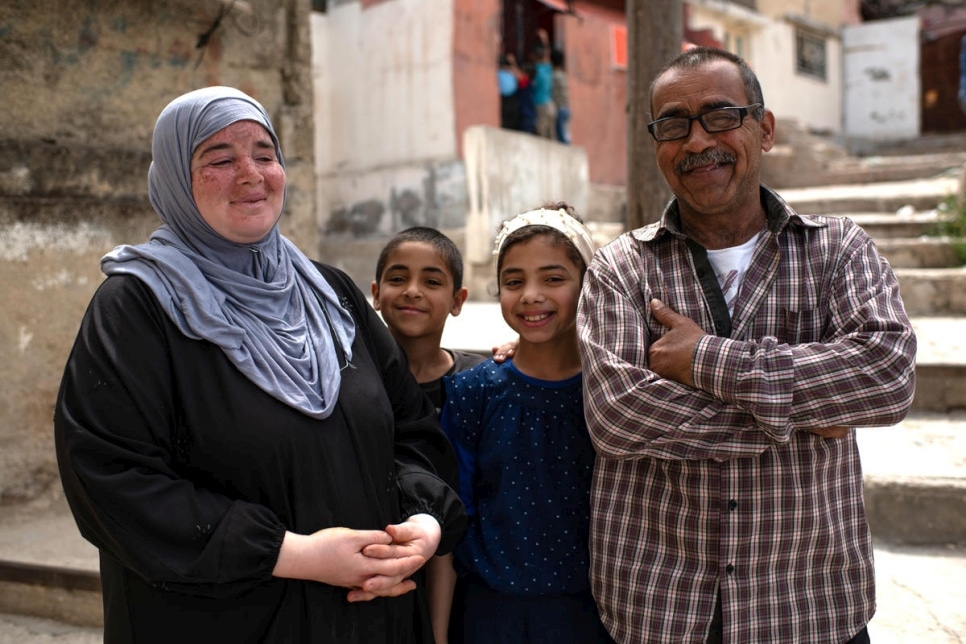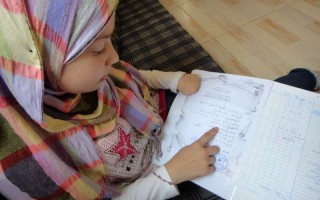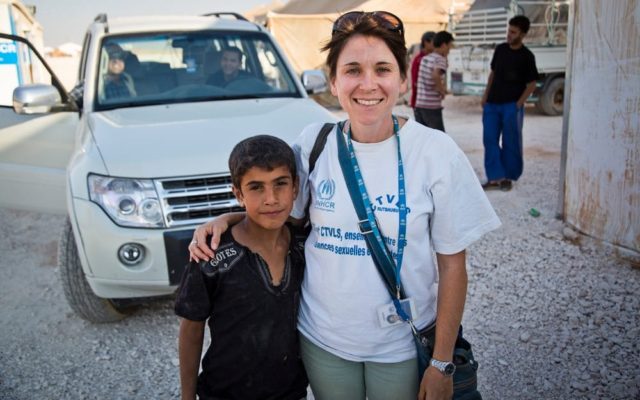
Syrian refugees Mustafa and Sherin stand with two of their children, Nadia, 12, and Muhammad, 10, outside their home in Amman during the COVID-19 lockdown. They fled Damascus in 2013. © UNHCR/Mohammad Hawari
This is a summary of what was said by UNHCR spokesperson Andrej Mahecic – to whom quoted text may be attributed – at today’s press briefing at the Palais des Nations in Geneva.
The economic downturn prompted by the COVID-19 pandemic has pushed hundreds of thousands of Syrian refugees in the Middle East into an ever more desperate situation and has increased their humanitarian needs, the UN Refugee Agency (UNHCR) has warned today.
The number of vulnerable refugees who lack the basic resources to survive in exile has dramatically surged as a result of the public health emergency. The refugee hosting communities in countries in Syria’s neighbourhood experience similar hardships. Many refugees have lost what were already meager incomes, forcing them to cut down on the most basic needs, including food and medication.
Refugee households are taking on additional debt and are not able to pay their rent anymore., Serious protection risks are growing, including risks of child labour, gender-based violence, early marriage and other forms of exploitation.
Since the start of the pandemic, UNHCR has provided emergency cash support to nearly 200,000 additional refugees in Egypt, Iraq, Jordan, Lebanon and Turkey who previously did not receive financial aid, along with other efforts to mitigate the impact of the pandemic. The five countries alone host more than 5.5 million Syrians, the biggest refugee group in the world. The agency is attempting to support at least 100,000 more refugees with one-off payments.
However, many refugees still do not know how they will cope. In Jordan for example, only 17,000 out of 49,000 newly identified vulnerable families received emergency cash support, as UNHCR is lacking the funds to extend its programmes. We are working with partners who support the local communities hosting refugees. Nine out of ten Syrian refugees in the region live in towns or villages and not in camps. The majority lives in low income areas. Host communities have shown great solidarity, but they have also suffered loss of livelihoods as a result the COVID-19 pandemic.
Beyond the immediate emergency, continued support to national systems is a priority. Crucial steps have been taken to ensure that refugees are included in countries’ national public health responses to COVID-19, in addition to the long-standing access for refugees to other services such as education.
Even prior to the pandemic, the majority of Syrian refugees in the region have been living below the poverty line. Those most in need have been receiving cash or other types of support. A recent survey in Jordan showed that only 35 percent of refugees said they had a secure job to return to after the lifting of COVID-19 restrictions.
To improve protection of the most vulnerable refugees and host community members through better ensuring their livelihoods, UNHCR appeals for strong and unwavering international support to the main host countries in the region. The Syria Refugee Response and Resilience Plan in 2020 is currently updating its requirements in light of the additional needs related to COVID-19. The US$5.5 billion plan was only 20 per cent funded across the region before the onset of the virus.
UNHCR is equally concerned about the humanitarian situation of returnees, more than 6 million internally displaced Syrians and other vulnerable groups inside Syria. Prior to the latest downturn, according to UN estimates over 80 per cent of Syrians lived below the poverty line. More than nine years of this crisis have left 11 million people in need of humanitarian assistance. The situation has become more dramatic and difficult over the past months as the economy has sharply deteriorated.
For more information on this topic, please contact:
- In Amman, Rula Amin, aminr@unhcr.org, +962 790 04 58 49
- In Amman, Andreas Kirchhof, kirchhof@unhcr.org, +962 791 825 473
- In Amman Lilly Carlisle, carlisle@unhcr.org, +962 65 30 27 73
- In Beirut, Lisa Abou Khaled, aboukhal@unhcr.org, +961 71 880 070
- In Geneva, Andrej Mahecic, mahecic@unhcr.org, +41 79 642 97 09
Originally published on UNHCR on 16 June 2020





